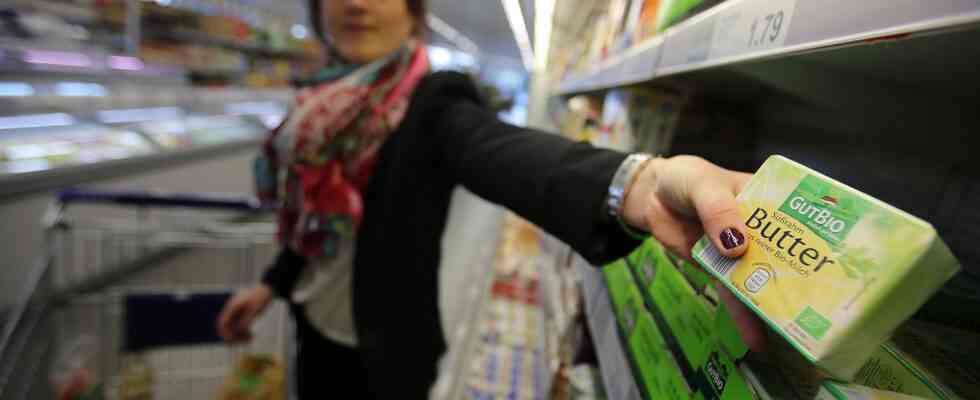Status: 04/12/2022 08:05 a.m
According to experts, the recent wave of food price increases could only be the beginning. What has become particularly expensive – and how do people with little money deal with it?
“Purchasing has never been so expensive,” says Sarah Friedhof. The student has just come out of a supermarket in Cologne with a full shopping bag. “A cucumber for 99 cents, the butter cost me more than three euros. It’s slowly becoming unaffordable,” says the 26-year-old.
An end to the price increases is not in sight. Aldi has announced higher prices and so have bakeries. “The second wave of price increases is coming, and it will certainly be in the double digits,” says Josef Sanktjohanser, President of the German Trade Association. He warns of further increases after prices had risen by around five percent as a result of higher energy prices before the start of the Ukraine war.
Flour, pickles, salad – all much more expensive
If you take a closer look at a classic break roll, the price increases become clear: According to the Federal Statistical Office, the roll and cheese are up seven and 4.7 percent respectively compared to the previous year. It is around 17 percent for lettuce and even 30.3 percent for cucumbers.
According to the Federal Statistical Office, cucumbers in supermarkets currently cost almost a third more than they did a year ago.
Image: picture alliance/dpa/dpa-Zentral
The prices of other items from the classic range of foods in a supermarket also climbed by high double-digit percentages. The price of sunflower oil rose by 28.9 percent, tomatoes by 27 percent and rye flour by 22.5 percent.
“We still live on supplies to some extent”
“Prices will continue to rise, albeit at a slower pace,” says Thomas Roeb. The economist from the Bonn-Rhein-Sieg University of Applied Sciences thinks that the price increases are actually still moderate in view of the increased costs for raw materials, transport and production. “At the moment we are still partially living on stocks here in Germany and on the world market. However, Ukraine will be absent as a supplier for a longer period of time and energy prices will also tend to rise due to the failure of Russia, due to the severely disrupted contacts with China caused by the corona measures there remain silent, so that overall no improvement can be expected.”
The expert expects many food retailers to follow suit shortly. Because as the largest German discounter, Aldi had already raised prices last week and is traditionally considered the price leader. The Rewe chain said on request that it was currently confronted with “a large number of rising costs for raw materials, energy and logistics as well as price increases in the food industry and suppliers”. This leads “inevitably to the fact that we have to increase the sales prices for individual product groups and articles”.
Discounts just before closing time
Sarah Friedhof is now paying more attention to reduced products and “bargains”. “I had never done that before,” says the Cologne student. She now plans her purchases more carefully so as not to throw away any groceries. In addition, they shop more often just before the store closes to take advantage of any discounts and reductions in price.
Even after the recent price increases, it is clear that dairy products will soon become even more expensive. “The prices are rising to an extent that I have never experienced before,” says the general manager of the dairy industry association, Eckhard Heuser. The cheapest 250-gram pack of branded butter currently costs EUR 2.09, which is 44 percent more than a year ago. “I assume that the price will continue to rise,” says Heuser.
trend for many years?
The products affected are primarily those that have something to do with grain and oil from the Ukraine, says Thomas Roeb. “The grain from the Ukraine was also used as animal feed. If it is now used as food, then meat will be much more expensive here too.”
It is to be feared that we will also have to reckon with significantly increasing food prices in the long term in the coming years. Because of a change in supply chains and rising energy prices, many inputs for agriculture, such as animal feed or fertilizers, are likely to become more expensive.
“What about families who have little money? What about people who live in poverty?” asks the student Sarah Friedhof. You can understand the development. “But in the long run, the rise in prices must be stopped. I would like help from politicians to relieve people.”

